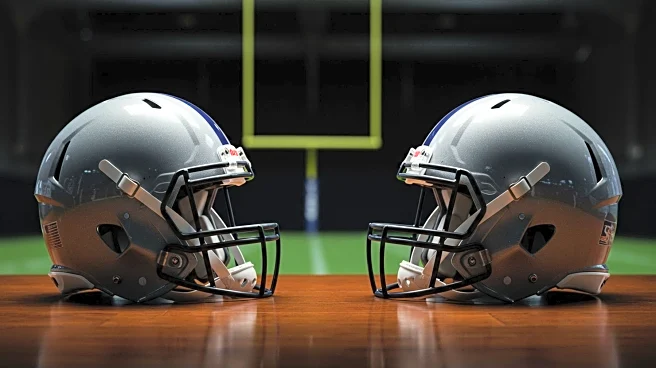What's Happening?
As the NFL training camp season begins, several players are engaging in holdouts or hold-ins to negotiate new contracts. Notably, Bills running back James Cook has secured a four-year, $48 million deal with $30 million guaranteed, ending his hold-in. Cook's contract negotiations highlight the ongoing trend among NFL players seeking better terms. Other players, such as Dallas Cowboys pass rusher Micah Parsons, Cincinnati Bengals pass rusher Trey Hendrickson, Washington Commanders WR Terry McLaurin, and San Francisco 49ers WR Jauan Jennings, are also in various stages of contract negotiations. Parsons has yet to begin talks with the Cowboys, while Hendrickson's negotiations with the Bengals appear close to resolution. McLaurin's discussions with the Commanders are reportedly far apart, and Jennings is close to a deal with the 49ers due to injuries in their wide receiver lineup.
Why It's Important?
These contract negotiations are significant as they reflect the broader dynamics of player compensation in the NFL. Players are increasingly leveraging their performance and market value to secure favorable contracts, impacting team salary caps and roster decisions. Successful negotiations can lead to improved team performance, while prolonged disputes may affect team cohesion and player morale. The outcomes of these negotiations could set precedents for future player contracts, influencing how teams manage their financial resources and prioritize player retention.
What's Next?
The resolution of these contract negotiations will likely impact team strategies and player availability for the upcoming season. Teams may need to make financial adjustments or roster changes to accommodate new contracts. The ongoing negotiations could also prompt other players to seek similar deals, potentially leading to a wave of contract renegotiations across the league. Stakeholders, including team management and player agents, will continue to navigate these discussions to reach mutually beneficial agreements.
Beyond the Headlines
The trend of players holding out for better contracts raises questions about the balance of power between players and teams in the NFL. It highlights the evolving nature of player agency and the importance of financial security in professional sports. These negotiations may also influence public perceptions of player loyalty and team management practices, contributing to broader discussions about labor relations in sports.









